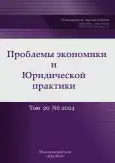Fundamental Trends in the Allocation and Use of Economic Resources
- Authors: Fattakhov R.V.1, Khachatryan A.A.1
-
Affiliations:
- Financial University under the Government of the Russian Federation
- Issue: Vol 20, No 6 (2024)
- Pages: 172-179
- Section: Regional and Sectoral Economics
- URL: https://bakhtiniada.ru/2541-8025/article/view/284593
- DOI: https://doi.org/10.33693/2541-8025-2024-20-6-172-179
- EDN: https://elibrary.ru/MMCPWG
- ID: 284593
Cite item
Abstract
The article is devoted to the study of global fundamental trends and trends that have a long-term and sustainable effect, affect every inhabitant of the planet and shape human civilization for many years to come. These megatrends are changing the world faster than predicted and affecting the transformation of socio-economic and political systems. The article examines the impact of global trends and trends on human, natural and material resources. The purpose of the study is to review global fundamental trends and trends, as well as to analyze the vector and patterns of their influence on the process of allocating economic resources. Conclusions. The analysis of global trends and trends and the assessment of the impact on national key economic resources can lead to a synergistic effect in their spatial distribution. This is largely due to the interaction between trends that increase the speed and ubiquity of change. This work will be of interest to researchers in the field of spatial distribution of economic resources as the basis for balanced economic development in the long term.
Full Text
##article.viewOnOriginalSite##About the authors
Rafael V. Fattakhov
Financial University under the Government of the Russian Federation
Author for correspondence.
Email: rfattakhov@fa.ru
ORCID iD: 0000-0002-5863-7982
SPIN-code: 3376-4475
Dr. Sci. (Econ.), Professor, Scientific Director of the Institute of Regional Economics and Inter-Budgetary Relations
Russian Federation, MoscowAstghik A. Khachatryan
Financial University under the Government of the Russian Federation
Email: AAHachatryan@fa.ru
ORCID iD: 0000-0001-6493-680X
SPIN-code: 2695-2955
Scopus Author ID: 57211625263
Researcher at the Institute of Regional Economics and Inter-Budgetary Relations
Russian Federation, MoscowReferences
- Glushchenko, A.V. The system of balanced target indicators as a tool for unifying the process of ensuring ecological and economic balance / A.V. Glushchenko, E. P. Kucherova, E. N. Samedova // Bulletin of the Academy of Knowledge. —2019. —№ 31(2). —pp. 77–83. —EDN XNQTLQ.
- Zubarevich N.V. Regions of Russia at the end of 2023: was it possible to overcome the crisis recession? // Questions of theoretical economics. 2024. No.1. pp. 34–47. doi: 10.52342/2587-7666VTE_2024_1_34_47.
- Climate change 2021: The physical scientific basis. Contribution of Working Group I to the sixth assessment report of the Intergovernmental Panel on Climate Change Masson-Delmotte, V., P. Zhai, A. Pirani, S.L. Connors, K. Pean, S. Berger, N. Code, Y. Chen, L. Goldfarb, M. I. Gomis, M. Huang, K. Leitzell, E. Lonoy, J. B. R. Mathews, T. K. Maycock, T. Waterfield, O. Elekchi, R. Yu and B. Zhou (eds.)]. Cambridge University Press, Cambridge, UK and New York, New York, USA, p. 3-32, doi: 10.1017/9781009157896.001// [Electronic resource] URL: https://www.ipcc.ch/report/ar6/wg1/downloads/report/IPCC_AR6_WG1_SPM_Russian.pdf (accessed 10/20/2024).
- Makar, S. V. Assessment and spatial patterns of innovation development in the regions of Russia / S. V. Makar, A.M. Nosonov // Economy. Taxes. Law. —2017. —Vol. 10. —No. 4. —pp. 96–106. —EDN ZQOIAB.
- Makar, S. V. Long-term accents of spatial development of individual countries: towards the study of component interconnections / S. V. Makar // Eurasian Law Journal. —2023. —№ 6(181). —Pp. 480–482. —EDN DJRQYH.
- Minakir P. A. The Russian economic space. Strategic dead ends //The economy of the region. —2019. —vol. 15, issue 4. —pp. 967–980. file:///C:/Users/AAHachatryan/Downloads/rossiyskoe-ekonomicheskoe-prostranstvo-strategicheskie-tupiki.pdf.
- Orlov S.L. Modern transformation of the economic space of Russia: fundamental foundations and a look into the future / Report at the II International Scientific and practical Conference «The Economic space of Russia: current trends and forecasts after 2030» (Moscow, April 17, 2024, Financial University).
- Poletaev, I. Yu. Ensuring the balance of measures to improve the efficiency of energy resources use in the Russian Federation / I. Yu. Poletaev // Bulletin of the Tyumen State University. Socio-economic and legal research. —2020. —Vol. 6. —No. 4. —pp. 334–347. —doi: 10.21684/2411-7897-2020-6-4-334-347. —EDN XMMRZN.
- Porfiriev B.N., Shirov A.A., Kolpakov A.Yu., Edinak E.A. Opportunities and risks of climate regulation policy in Russia. Economic issues. 2022;(1):72-89. https://doi.org/10.32609/0042-8736-2022-1-72-89.
- Stroev, P. V. Spatial development of Russia in modern realities / P. V. Stroev, R. V. Fattakhov // Ufa Humanitarian Scientific Forum. —2022. —№ 2(10). —Pp. 99–109. —doi: 10.47309/2713-2358_2022_2_99_109. —EDN PQKSVA.
- Tolkachev, S. A. Industrial development as the basis of economic sovereignty / S. A. Tolkachev // Ensuring the economic sovereignty of Russia in the conditions of the formation of a multipolar world: Materials of the International Economic Forum, Moscow, April 09-10, 2024.—Moscow: Federal State Budgetary Institution of Science Institute of Market Problems of the Russian Academy of Sciences, 2024. —pp. 430–433. —EDN UYRBSQ.
- Filimonova, N. N. Technological development of the Russian economy: trends and prospects / N. N. Filimonova, A. Y. Egorov // Modern information technologies in education, science and industry : Collection of scientific papers of the XIV International Conference and the XII International Competition of scientific and methodological works, Moscow, November 01–02, 2019 of the year. —Moscow: Limited Liability Company «Ekon-Inform Publishing House», 2019. —pp. 209–213. —EDN IPOOGS.
- Schwartz, R. S. Diagnostics of the balance of the sectoral structure of the regional economy based on the analysis of structural shifts / R. S. Schwartz // Politics, economics and innovations. —2019. —№ 1(24). —p. 7. —EDN YXRKRV.
- Shuper, V.A. Mastering the space for the transformation of the country // Questions of philosophy. —2024. —No. 8. —pp. 5–15.
Supplementary files












